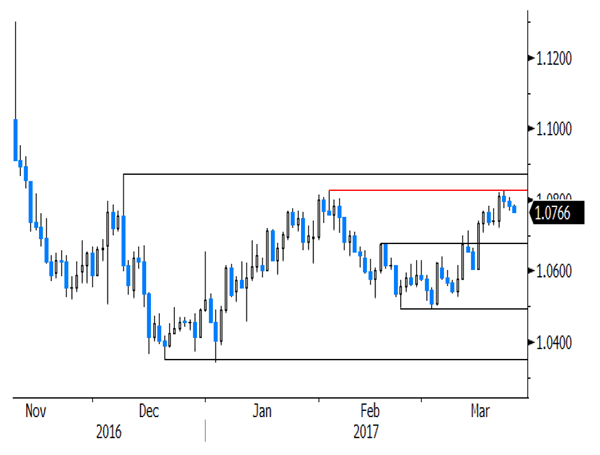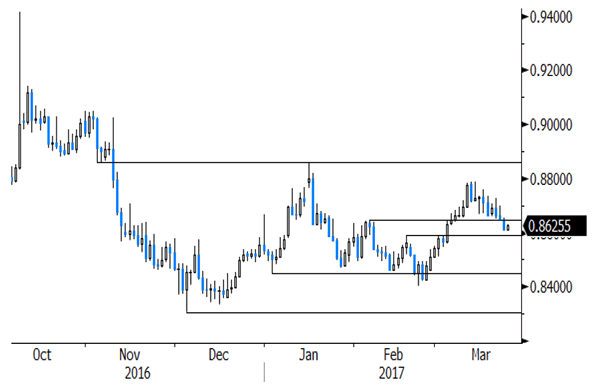Sunrise Market Commentary
- Rates: Vote on healthcare bill crucial for sentiment
We expect both eco data and Fed governors to be overshadowed by the vote on the new healthcare bill. Failure to push the bill through could signal problems ahead for his economic agenda and might falter markets’ faith in the reflation trade. In that case, the US 10-yr yield might test 2.3% support. The reaction in case of a ‘yes-vote’ will probably be smaller. - Currencies: Healthcare vote to decide on next USD move
Yesterday, the dollar traded indecisively as uncertainty on the US healthcare vote weighed. An approval of the bill might trigger a relief rally of equities and of the dollar. However, we assume that more positive US news is needed to change the fortunes for the dollar in a sustainable way.
The Sunrise Headlines
- US stocks closed ended flat, as the vote on a bill to roll back Obamacare was delayed to today. Overnight, Asian risk sentiment is more positive as the Freedom Caucus said they would discuss an ‘improved’ bill proposal.
- Trump warned Republicans to pass a new healthcare bill or risk being stuck with Obamacare. The outcome of the vote is on a knife-edge having fractured his party and turned into a test of his ability to deliver on the rest of his agenda.
- BoJ Governor Kuroda said there is "no reason" to withdraw the bank’s massive monetary stimulus now, or raise its bond yield targets, as inflation remains far from its 2% goal.
- Dallas Fed Kaplan said the central bank should roll off both MBS and Treasury holdings when it begins to let its balance sheet shrink. Kaplan also said that the median expectation for 3 rate increases in 2017 is a reasonable baseline.
- SF Fed Williams expects 3 or 4 times hikes this year. He would like to see a fed-funds rate that is ‘half way’ to its eventual resting level before beginning to wind down the balance sheet. That will probably be late this year.
- Growth at Japanese manufacturers softened to a three-month low in March as output and new orders increased at a slower rate. The preliminary PMI dropped to 52.6 last month, down from February’s reading of 53.3
- Today’s eco calendar contains EMU PMI data and US durable goods orders. Fed governors Evans, Bullard, Dudley and Williams are scheduled to speak.
Currencies: Healthcare Vote To Decide On Next USD Move
Healthcare vote to decide on next USD move
On Thursday, USD indecisiveness prevailed as markets waited whether the Trump administration would be able to pass a first vote to repeal Obamacare. USD/JPY traded with a slight negative bias and closed the session at 110.94 (from 111.16). EUR/USD finished the session at 1.0783 (from 1.0797). So, the dollar continued to hold up better against the euro than against the yen, with EUR/USD staying away from the key 1.0829/1.0874 resistance.
Overnight, markets see a rising chance that the changes to the healthcare Bill will get enough support from the House Freedom Caucus to pass the House vote. This supports risky assets (equities) in Asia.. USD/JPY is off yesterday’s lows and trades again round 111.50. EUR/USD (1.0765/70 area) is also drifting cautiously south. The dollar rebound is supported a slight rise of US yields. Of course, the Trumpcare is no done thing yet.
The eco calendar contains two interesting reports. In EMU, PMI business confidence is expected slightly softer (55.8 in March from 56. After recent regional sentiment data, we put the risks for the EMU PMI on the downside of expectations. However, confidence remains at a healthy level. The US durable orders are expected to have risen 1.3% M/M, following a 2% M/M rise in January. We support the consensus view and have no arguments to deviate, but the report is very volatile in nature.
In a day-to-day perspective, the eco data (potentially softer EMU PMI and decent US durables) might be intrinsically USD supportive. However, the focus will be on the vote on Trump-care. An approval (most ‘likely’ scenario?) might trigger a short-term relief rally in equities and the dollar. However, this rebound likely won’t go far. The bumpy road ahead of the vote suggests more difficulties when other key issues (taxes etc) will be brought to Congress. So, more other USD positive news is needed to really call an end to the recent period of USD softness. A failure to pass the bill is USD negative with probably a confirmation of the downside break in USD/JPY. In that scenario, EUR/USD might go for a test of the 1.0829/74 area. A break is possible, but far from sure. We still doubt that the EUR/USD has really big upside potential if sentiment on risk were to turn outright negative
In a longer term perspective, we don’t change our USD-constructive bias based on the eco fundamentals. However, this doesn’t tell anything on the short-term momentum dynamics.

EUR/USD: topside blocked if Trump-care is to be approved?
EUR/GBP
Sterling extends gradual comeback, for now
Sterling remained well bid yesterday and EUR/GBP traded with a slightly negative bias going into the publication of the UK retail sales. The ONS February retail sales (1.4% M/M and 3.7% Y/Y) were stronger than expected. Sterling rallied further and EUR/GBP dropped to the low 0.86 area. Cable jumped to the 1.25+ area. However, the sterling rally ran into resistance even as the CBI retail data (published at noon) also suggested decent retail activity in March. Sterling is currently apparently more sensitive to (better than expected) price data, rather than activity data. EUR/GBP closed the session at 0.8612. Cable finished the day at 1.2521.
Overnight, BoE Vlieghe in a press article said that higher inflation didn’t mean a rate increase. He wants evidence on strong wage growth before considering voting for a rate hike. Sterling is losing a few ticks this morning. Later today, only the BBA loans for Home Purchases are scheduled for release. Last week, sterling found a better bid after the early March decline. Some time ago, EUR/GBP cleared 0.8592 resistance, improving the MT technical picture. However, this week’s (substantially) higher than expected UK inflation probably put a decent floor for sterling short-term. We changed our short-term bias on EUR/GBP from positive to neutral. Some further consolidation in the 0.85/0.88 area might be on the cards. Longer term, Brexit complications remain a potential negative for sterling, but this issue isn’t in the spotlights right now. We are not convinced that the BoE will raise rates anytime soon, even not after this months’ higher inflation data.

EUR/GBP: sterling remains well bid after higher UK inflation earlier this week
